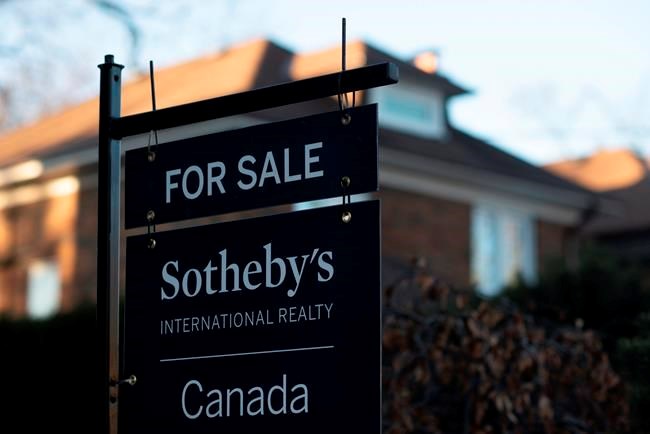TORONTO — A wave of buyer's remorse is taking shape in several heated real estate markets, after housing prices started dropping and the number of sales slowed over the last two months.
Realtors and lawyers in Toronto and Vancouver say they have noticed buyers looking at what options they have to get out of a purchase and sellers hoping to ensure one goes through because conditions have shifted dramatically from the previous highs and frenzied pace.
The country experienced a 25.7 per cent drop in the number of homes sold over the last year and a 3.8 per cent slide in housing prices between March and April, the Canadian Real Estate Association said Monday. The average home price last month totalled $741,517.
Such numbers have prompted some sellers to explore lawsuits to ensure transactions move forward and other purchasers to worry about the value of pre-sale properties they bought years ago but have yet to take possession of.
“With today's real estate prices, there's really no option but to go all in and if you're going all in, and then suddenly you're realizing that perhaps you made a bad bet and there's a way out of that bet, you're going to do whatever you can to get out,” said Mark Morris, a Toronto real estate lawyer.
In recent weeks, he has seen nine cases where buyers want to back out of deals but on Monday alone was approached by three sellers keen to use legal channels to keep purchasers from walking away.
Morris doesn't call the encounters a trend because it's unclear how many other lawyers are seeing the same spate, but three queries in a day is his new record. He used to see one case of that nature every few months.
“Purchasers are looking at the existing crisis, and in the best of times, they feel they overpaid, but now they have objective proof that they've done so because markets have started to pummel and fall and really shows no signs of slowing down,” said Morris.
“Many of those buyers are faced with the option of moving forward or upping and walking.”
People get "spooked" every time the market turns and explore what they can do about deals they signed, but few end up walking away because it's hard to get out of such transactions, said Phil Soper, CEO of Royal LePage.
He thinks the exception to this pattern came in 2020, when the COVID-19 pandemic broke out and people wanting out of transactions had so many unknowns on their side.
Most buyers trying to end a deal this year won’t be successful because there is no legal way out, but such cases are also impractical for sellers, Morris said.
“Is a seller really willing to pursue a buyer that has no assets? Is the seller really going to go through three years of courts only to find that they have a judgment that can't be pursued?” he pondered. “Are they really ready to put up the amount of money that it will take to pursue this to the ends of the earth if they're ableto resell? Perhaps not.”
In cases where the buyer has put money into a seller's trust account, that money can only be released with a court action, the closing of the deal or a mutual agreement not to pursue the sale, said Morris. He's seen buyers agree to give the seller the money, if the seller mutually agrees to end the deal.
If a deal ends, brokers can sue for their lost commission but not many explore this avenue because it's "not a good look" to take legal action against a client, who might still turn to you when they try to sell the home from the failed transaction again, said Morris.
While Tirajeh Mazaheri hasn't seen legal action in Vancouver, the Coldwell Banker Prestige Realty agent has seen buyer's remorse and worry crop up among investors who purchased pre-construction homes a few years ago but have yet to take possession of them.
"A lot of those people are thinking, 'Is the market going to be able to justify this price or keep up with the price I paid and can I get this money back if I want to sell in a year?" she said.
The people who purchased in early rounds of pre-construction sales for a building are already ahead of the curve, but those who bought later will have to wait longer to break even or make a profit, she said.
Even though worry is at a high, Mazaheri and Soper agree the markets do rebound and homes are still a valuable investment.
"Anyone who bought a home in 2021 in this country, if they bought anywhere near market price, their home is going to be worth more than in 2021," said Soper.
"Will it be worth more one year from now? That's harder to predict … but even a year from now the likelihood of that home being worth less than it is today is smaller."
This report by The Canadian Press was first published May 18, 2022.
Tara Deschamps, The Canadian Press
Note to readers: This is a corrected story. An earlier version misspelled Phil Soper's last name.



